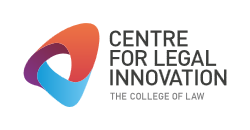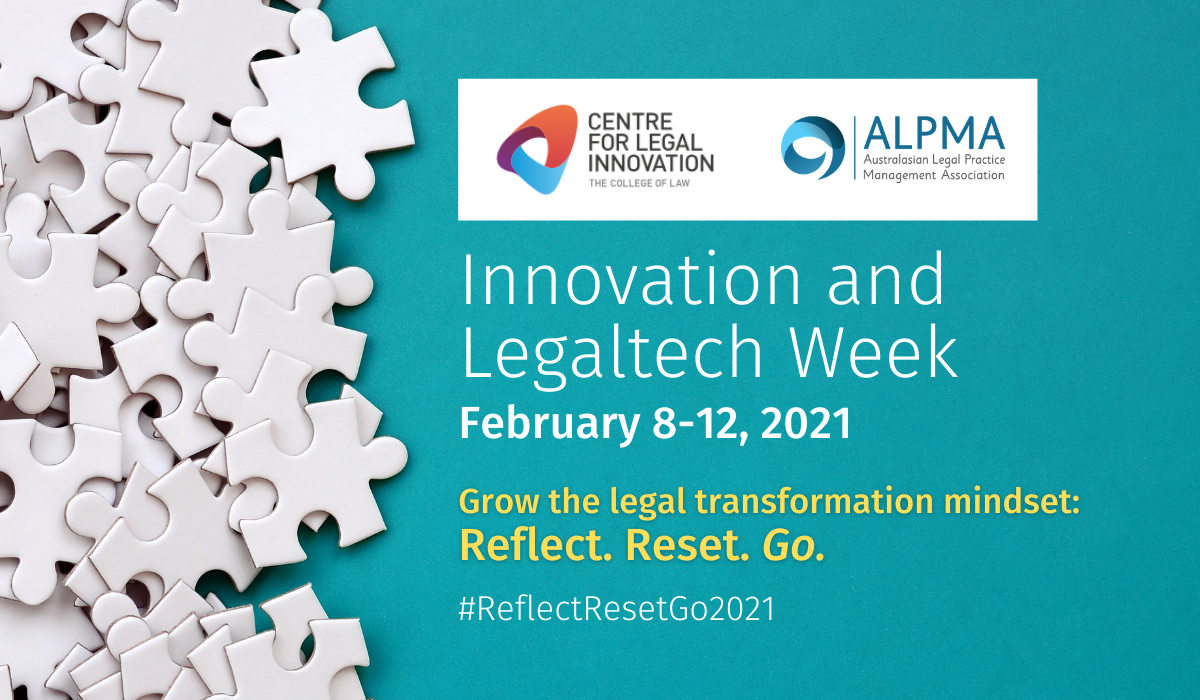The need to innovate is not new. But due to the pandemic, many lawyers are being forced to invest in new technologies, processes and people – before they otherwise would have. It’s therefore no surprise that the legal industry is now asking, “What will the new normal be?”
The Innovation and Legaltech Week 2021 conference is here to answer this question.
A collaboration between the Australasian Legal Practice Management Association (ALPMA) and The College of Law’s Centre for Legal Innovation (CLI), the event aims to shift the mindset of the legal industry – and act as a catalyst for sustained continuous improvement.
The perfect time to talk innovation & tech
The free virtual event, held 8-12 February 2021, is nearly a year on from when the coronavirus first began to disrupt the legal industry across Australasia and the world.
And this timing is no coincidence.
ALPMA CEO Emma Elliot says, “Legal practitioners and allied legal professionals typically review their strategic plans in January and February and reset for the coming year. We wanted our event to align with this timing to help our community.”
“However, there’s more to it than that. Being almost 12 months on from the start of the pandemic, we believe it’s the perfect time to reflect on how firms, and the industry at large, have adapted during this period.
“In many ways, firms have had to approach 2020 as one big experiment. They were forced to change; to evaluate the necessity and effectiveness of almost everything they do. This shift has planted the seeds of transformative thinking within the legal sector.
“Our event aims to continue the conversation and encourage that new lens, longer term,” says Emma.
Event attendees will hear from leaders in the legal industry who have embraced change through multidisciplinary team collaboration, new technologies – and by embedding a culture of continuous improvement.
Importantly, they will hear from those who have not been afraid to fail.
“For firms who are not yet comfortable with the changes that are occurring, we hope this event will help them see disruption as an opportunity—and start to grasp it with both hands."
The program at a glance
This idea of reflecting on what’s happened, adjusting to the future and implementing change is encapsulated in the program’s tagline: Reflect. Reset. Go.
Developed in consultation with volunteers from different parts of the legal ecosystem, the program is split in two parts: interactive discussions in four key areas over the first four days – and a workshop on the final day.
“On day one, we start by exploring how and why a change in mindset is critical in our industry. Day two looks at how small and big things can help reinvent your practice once you start to make that mindset shift.
“The third day looks at how changes in our industry require different capabilities and the importance of working collaboratively with diverse people. And the fourth day explores the changing profile of your clients and how to put their needs and expectations first.”
“Importantly, we will not just be discussing change. We’ll be showcasing it in action through case studies from law firms, in-house legal departments and alternative legal service providers that are embracing tech and innovation.
“At the end of each day, we’ll either take everyone on a tour around the world to learn what’s hot in innovation and tech—or they’ll see how firms are using legaltech hubs around Australia to prepare for the future,” she says.
Goodbye to silos—hello to a diverse program
To any legal professional who frequents the conference scene, this program offers a distinct difference: it has no silos. Rather than having job-based streams, every session is multidisciplinary.
Terri says, “We believe the best solutions come from diverse approaches and ideas. That’s why we designed the program to encourage participation, experience sharing and networking for people across the legal ecosystem.
“We want attendees to engage in multidisciplinary discussions and take away practical tips they can use at work the next day."
“When you look at the sessions in our program, you’ll see that they include specialists who don’t work in legal practice. This is because we want attendees to recognise how important it is to learn from other industries, develop new capabilities and integrate these into our work in the legal world,” she explains.
Catered to all levels of knowledge
Each day will start with foundational presentations on that day’s theme. The middle of the day will be intermediate—and the end of the day will cover more advanced topics.
Terri says, “Other legal tech and innovation events typically hit ‘the middle’ when it comes to skillsets and knowledge. This means that after a while, regular event goers are not taking anything new away.
“We wanted this program to be for everyone—regardless of their knowledge to date.
“People who are completely new to an area can immerse themselves in that area for a whole day, establishing and then cementing their knowledge in a matter of hours. Meanwhile, those who are already familiar with an area can tune in when it suits them, as discussions become more advanced,” she says.
The key benefits of the week
A combination of live events and on-demand content, the program is highly practical. It focuses on skills that attendees can learn, discuss and use immediately.
Then there’s the networking. Even though it will be held online, the conference promises to act as a bridge in creating meaningful connections, while bringing communities together, locally and internationally.
Importantly, the value of this conference will also be long-lasting.
Terri says, “This event is so much more than a single week on the legal professional development calendar. It will serve as a launching pad for ongoing community conversations throughout 2021.
“And because our two professional bodies are hosting the event, attendees know we have their best interests at heart. We will hold more events for our respective communities after this one. We are here for the long run,” she says.
A core message: continuous improvement
Emma says, “Our organisations exist to help our members and the wider legal community stay up to date on the ‘business of law’—including issues such as innovation, technology adoption, change management and leadership.
“This past year, the business of law has transformed massively. But the story should not end here.
“In this age of digital disruption there’s no time to rest on your laurels. You need to keep disrupting your own business model or someone else will do it for you—and that’s when you become obsolete.
“However, the solution to addressing this upheaval isn’t to blow up your firm and start again. It’s about making incremental changes. Work to solve one pain point at a time and soon they will start adding up.
“Firms should be focusing on the sustainability of their business by creating a continuous improvement mindset and culture. That’s how our industry will evolve. That’s the bigger picture,” she says.
And yes, the event is free
While CLI and ALPMA have charged for events in the past, they decided not to do so this time so they can reach as many people as possible.
“We decided to make this a free event because we want to support our members and the legal community during these difficult times. However, this would not have been possible without the generosity of our faculty, sponsors and supporters.
“This is not about making money. It’s about collaborating and ‘paying it forward’ at a time when our community needs it most,” says Terri.

